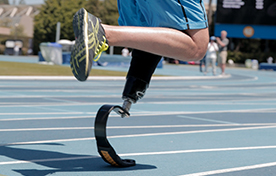Coping with Aging and Amputation
– by Omal Bani Saberi, LCSW, CCHT
“To grow old is to pass from passion to compassion.” – Albert Camus
We all get older. Unfortunately, many of us have to deal with amputation at the same time. Though we don’t have much control over aging, we do have some power over the way we see ourselves. As you age, you may face:
- Feelings of dependency
- Depression
- Helplessness
- Loss of control of your body and life
- Financial problems
- Reduced social life
- Physical illness, pain and other medical or health problems.
All of these problems will likely be intensified when an amputation occurs. Change is hard after all. You have lived decades with the way your body has looked, and you have used your limbs to do things without much thought. Now what you have taken for granted – the way you look, the way you move – has to be looked at in a different way, and you have to readjust to the world.
So What Do You Do?
First, you deal with the feelings of your loss. A part of your body is gone, and you have to deal with your anger, sadness, helplessness, loss of control, etc. Since amputation is a grief process, this may take some time. The good news is that as time passes, the feelings of loss, although still there, will be less intense.
You can learn to cope with life differently by changing the way you think. Mind and body affect each other greatly. If you think less of yourself or are mad at your body, you are likely to sleep less, eat more/less, and not let other people near you. Can you imagine how much just these three things can affect
- Your thinking
- Your concentration
- Your focus
- How you get support
- How quickly your body heals.
Imagine yourself as a camera, the photographer, the lens, the film. You can choose which picture to take, what to focus on, and which lens you will use to view your limb loss and your life.
Perhaps you will choose the close-up lens and focus on how your limb loss looks – the scars, the flabby skin, the way clothes don’t fit like they did before. Perhaps you will get stuck there. What can you do? You can choose to look at these realities up close for a while and then in time choose to place them in the background and focus instead on other things about your body and your life. Your essential tools are patience and a willingness to reframe the camera lens.
This doesn’t mean that you have to deny your feelings; it just means that you will need to look at your life and your limb loss in a different way. Are you willing to do this? Are you willing to see that in a very real way in your everyday life, you can learn new ways of doing and being? You aren’t as helpless as you believe.
You have lost a limb, but you have not lost yourself or your ability to voice what you are thinking and feeling.
Watch Out!
Always remember that what you think determines what you do in life. Some thoughts might, however, be deceiving you about your physical, mental and emotional self.
Physical
Your thoughts may say, “Now that I am an amputee, I look different. Losing a limb means that I am a different person and that all I was in the past has disappeared.”
Is this really true? Of course, you look different now and there are changes and adjustments that you will have to make as an amputee. But are you really all that different? Before your amputation, was your physical appearance the only feature that mattered? No. Certainly you are far more than your physical appearance. You have skills, talents, and characteristics like compassion, integrity, love, understanding, etc. Are these parts of you less important than your limb loss? Certainly not!
How else can you tell your mind to stop telling you lies about your body? Decide to change unhealthy habits. Make lifestyle changes, and take more control of your life. Often we indulge in unhealthy habits because we are unhappy, nervous or depressed. Get some professional help if you need it.
Attitudinal
“A study that has been ongoing for 50 years has found that a flexible personality is one key to aging well,” notes Dr. Peter Lichtenberg. Limb loss, of course, is a new experience but, just as with aging, it is likely that the more flexible and open-minded you are, the more quickly your body will heal and the better your life will be.
You may think, “I’m too old now to learn to live with limb loss. I don’t think I can cope. It’s just too hard to live without all of my body parts. My friends won’t know how to deal with me. They may, in fact, not even want to be around me anymore. Who cares anyway? Who knows how many years I have to live?”
So how should you respond to such harsh and negative thoughts? First, be honest and admit that coping with aging and limb loss is difficult, but do not get stuck. Think back about how you’ve coped with other losses in your life.
Your belief that your friends may not be able to deal with your amputation is almost certainly not true. People who know and love you may be waiting for you to tell them how involved they can be in your life. They too are undergoing a loss and may not know how to “be there” for you. In fact, they may be waiting for a signal from you to let them know what to do. The friends who leave probably do so because of their own fears. Don’t take this personally! Some people may just be unable to cope with these circumstances at this time.
If your mind is telling you that nobody cares and that you may not live much longer anyway, you may be stuck in depression. (See the articles that follow on depression.) You may need professional help. As far as not knowing how many more years you have to live, that’s true for all of us. How we live the rest of our lives is what’s really important. Quality matters.
Change your attitude. If you have a sense of helplessness or dependency, raise your voice and assert yourself with confidence. Take an active role with your medical team and the other professionals in your life. Communicate the pain or discomfort you may have. The old belief that medical professionals were gods is not true. They are human beings who need your input to help you. If you are on medication, speak up if you think that you are taking too little or too much.
Emotional
You may think, “I will never get over this loss. I won’t be attractive to anyone anymore. I won’t be able to have an intimate or sexual relationship. I can’t have anyone be that close to me.”
Those of you who have been in a long-term relationship before your amputation may close yourself off from your mate. At first, this can be understandable (due to pain and discomfort.) After a while, keeping your mate away keeps you from having to deal with the emotional side of your disability. Unconsciously, if you allow your mate to be sexual, you will have to admit that your beliefs about being attractive or sexual may not be true. The way to overcome these feelings is to communicate honestly what you are afraid of and then slowly have your mate touch your body, even where your limb used to be. Of course, the mechanics of sex or lovemaking may have to change (slightly), but don’t be afraid of this. Allow your mate to touch you. She or he may not feel as negatively about your body as you do. This technique will often help you become more intimate and more sexual with your mate again.
If you are single, it might be a challenge to meet interesting people. It is for most of us, especially as we age and experience limb loss. Don’t write yourself off, however. Losing a limb is not a turnoff to everyone. Be vulnerable, take risks and feel confident about yourself. After all, your life up to now has taught you many things. Remember, how you think and feel about you largely determines how other people will treat you. If you are not open and ready, those who want to treat you well cannot get close enough to do so.
Other Ways to Help Yourself
Don’t isolate yourself. This can shorten your life span. People who are lonely often suffer from more health problems. If you are nearing retirement age or are already retired, it may be a great time to revive an old hobby or interest or to learn something new. You might also like to volunteer in your community. When people are active and “giving back,” they usually feel more fulfilled and less lonely. They are also more likely to feel better about their lives in general.
Focusing on the Right Things
As you experience aging and limb loss, you have power and control over what you choose to focus on. You can have images of self-respect, dignity and compassion and fill your surroundings with people who care about you, or you can get stuck negatively focusing on how your body looks and allowing this small part of you to define your whole life. What images will you choose to focus on?
My wish for you is that you will choose the lens that will show all of who you are and will not limit you to your age and your limb loss.
Disclaimer: The following information is provided and owned by the Amputation Coalition of America and was previously published on the website http://www.amputee-coalition.org or the Coalitions Newsletter, inMotion.








